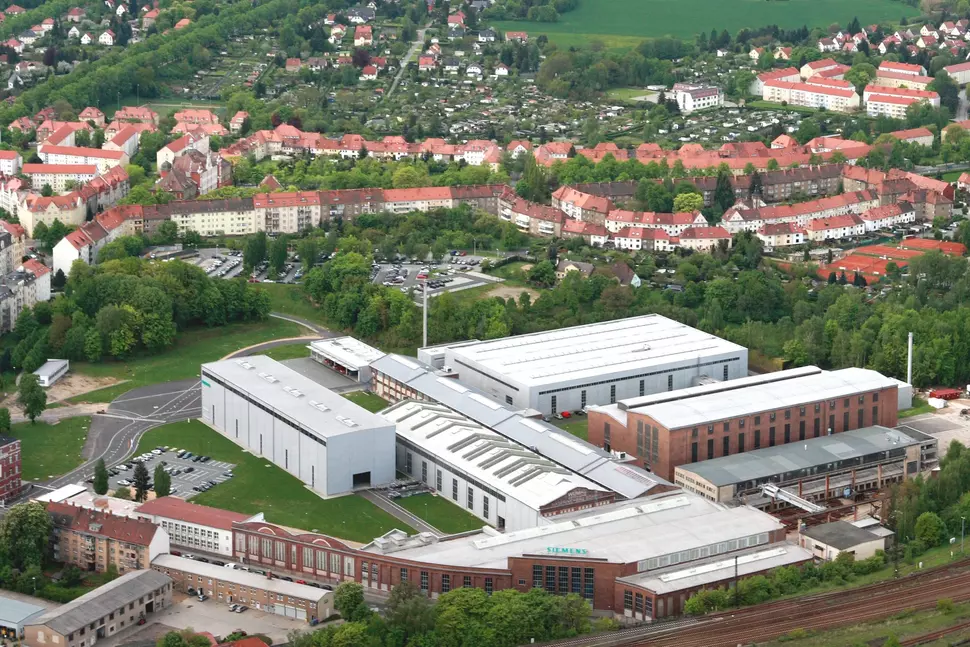Hydrogen Lab” East Saxony
The East Saxon region is honing its profile as a research and application venue for the relatively new hydrogen economy. Shining beacons of this development are the “Innovation Campus Görlitz” initiated by Siemens Energy as well as Fraunhofer’s “Hydrogen Lab Görlitz” (HLG).

“A Key Component of the Future Energy Branch”
“We’re convinced that hydrogen technologies will be a key component in the future energy branch, the supply of raw materials to industry, and the mobility of tomorrow,” emphasizes Dr.-Ing. Sylvia Schattauer of the Fraunhofer Institute for Wind Energy Systems IWES which is one of the stakeholders of this relatively new growth core in Görlitz. “With our extensive competences, we want to develop affordable, safe, and environmentally friendly solutions and jointly prepare companies so that they can enter new markets with these solutions along the entire value creation chain of the emerging hydrogen economy. This is a sustainable contribution towards assuring a successful transformation process and strengthening the economic power in the region as well as enhancing intelligent climate protection.”
For example, the Innovation Campus: Where highly qualified workers have been building turbines already for more than 100 years, a “cooperation platform for decarbonization, digitalization, and new manufacturing technologies” is now evolving as an addition to the existing facilities. The premises will include the coworking space “ENERGY” which has also supported temporary projects of creative minds with its offices for rent already since 2020 now.
Additional firms and research institutes have moved into the area around the traditional turbine factory. Among them are, for example, the eco-friendly flexible foam specialist eco-softfibre, the hydrogen tech company METALIQ, and a section of Dresden University of Technology’s Chair of Automobile Engineering.
The most recent example of a successful business setup is Deloitte. From Görlitz, the international business service provider wants to support its customers who come primarily from the public sector in implementing pioneering digitalization strategies and new architectures for information technology and safety engineering as well as analyzing process flows and process cycles.
Hydrogen Lab Investigates New Solutions for the Entire Value Creation Chain
With Fraunhofer, a renowned and acknowledged institute for applied industrial research has set up its business on the Innovation Campus: At the hydrogen test center (Hydrogen Lab Görlitz), the Fraunhofer Institute for Machine Tools and Forming Technology IWU and the Fraunhofer Institute for Wind Energy Systems IWES are pooling their capacities in the development of hydrogen technologies. In 2023, about 30 researchers have commenced with the development and testing of innovative technical solutions “along the entire hydrogen value creation chain” at this lab – ranging from hydrogen production to hydrogen storage all the way to its use. They pursue the objective of developing innovative solutions for large-scale industrial hydrogen technologies applied in stationary systems. Towards this end, the requisite systems technology is to be raised to a new technological level, readied for mass production, and brought to marketability. For this purpose, all systems of which many are still in the prototype status today shall be taken into consideration and examined closely.
The HLG has electrolyzers with overall capacities of up to twelve megawatts, test facilities for mobile and stationary fuel cells, and other infrastructures. The focus is on, for example, new materials, design principles, and production methods for reactor stacks in electrolyzers and fuel cells. The teams also analyze which factors are responsible for the reliability and life cycle of such systems, how microstructures influence the efficiency of the entire systems, which power electronics are needed in hydrogen technology, how production and ongoing operations can be digitalized and efficiently certified. Towards this end, they cooperate closely with Siemens Energy.
Structural Change in a Traditional Energy Region
The Federal State of Saxony and the German Federal Government have confirmed that they will finance the lab with startup capital of more than 42 million euros. There are good reasons for this public funding. Because Görlitz has the potential of offering examples both in Germany and around the globe of how the transformation of traditional coal districts towards pioneering technologies of the future can be mastered successfully.
“Lusatia is and continues to be an energy region. It’s characterized by lignite still today,” explains Prof. Welf-Guntram Drossel, Executive Director of the Fraunhofer IWU institute. Developing cutting-edge hydrogen technologies would not only be a chance to provide an environmentally friendlier source of energy than lignite: “In addition, the manufacture of innovative system components bears great potential for new value creation and high-quality jobs in the region. Commercial enterprises in Lusatia are offered a unique opportunity of taking the lead in a technology change.”
For the coming years, the project partners on site anticipate a dynamic development of the location: Additional stakeholders of the hydrogen economy and research community will set up their business here; in particular, also startups from this technology sector. “We’re expecting that the Fraunhofer hydrogen test center operated on the Siemens Energy Innovation Campus in Görlitz will evolve into a pioneering place that attracts both regional and national H2 stakeholders and that the H2 technology venue Görlitz will make further progress through the establishment of a research platform for hydrogen technologies,” states Siemens Energy.